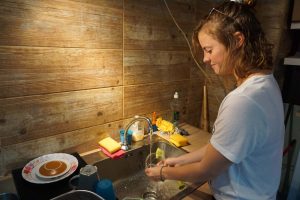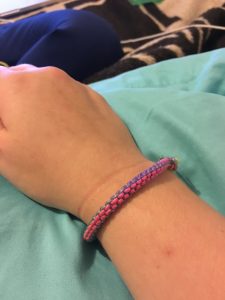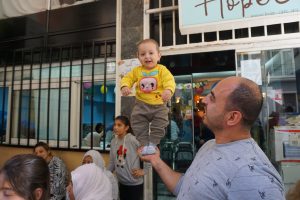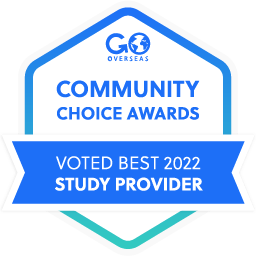There is Hope Out There
Mahatma Gandhi once said, “The best way to find yourself is to lose yourself in the service of others.”
This past week, I think I came a little closer to finding myself.
While study abroad programs often provide incredible opportunities for learning and traveling, the real experience isn’t found inside of a book or on a sunny beach or even at a historical site visit. The true study abroad experience is found beyond the classroom, in the heart of the often difficult realities that exist around us as we carry on with our daily lives.
CYA’s encouragement of students to partake in volunteer work while studying abroad provides individuals with these real-world encounters, which often involve the devotion of one’s time to the service of non-profit organizations and those in need. In Greece, these volunteer-run organizations are heavily aimed at providing aid and support to Syrian refugees.

Student volunteer, Maddy, washes dishes at Hope Cafe, with a bright smile on her face.
One such organization, Hope Cafe, founded and run by Kerrie Moor, provides a number of services for refugees and their families. Not only do they serve coffee and lunch for over 200 refugees a day, but they also provide hygiene products, clothing, baby products, and other essential items to refugee families and individuals in need. These services are completely volunteer-based, all of the food and products provided are donations, and what is even more astonishing is that often the refugees themselves are among those volunteering and helping in any way they can to make sure everyone gets the support they need.
What has amazed me is that after only two and a half hours at Hope Cafe, having never been there before, I had been adopted into a new family. In fact, some of the refugees gave more to me than I could ever have provided them. They openly accepted me, embraced me even.
As student volunteer, Maddy Altenau, said, there is a “sense of family that happens as soon as you walk in. There are so many people but everyone loves to say hello and ask how you are. They love learning English and learning each other’s names and knowing about the volunteers. There are no power structures or dynamics involved in the relationships between individuals or between volunteers and refugees or those who seek assistance from the cafe. They are all there to help.”
It is easy to get stuck in the routines of our everyday lives, mindlessly complaining about the traffic, or how long our reading assignment for class is, or not getting enough sleep. But when you experience the amount of joy that radiates from every single individual at a shelter like this, you forget about the petty things in life. Not one person at Hope Cafe — neither volunteer nor refugee — had anything but a smile on their face.
My intention when going to the cafe had originally been just to observe the environment, take note of what the student volunteers did while they were there, take one or two photos of these students, and then interview them about their experiences. I did not intend to take photographs of any refugees as to be considerate of privacy. Yet, as soon as my camera was seen, children and adults alike, started asking for pictures: a father posed, balancing his young, standing baby in the palm of one hand; three siblings stood in front of their parents, posing for a family photo; a young man stared into the camera lens with a simple smile on his face; a little girl pleaded to take a picture with me, so we handed the camera off to another volunteer and we smiled together; and another young man wanted to take a photo, so I showed him how to use the camera, and he snapped a close up of my huge face.
Sometimes the things in life that bring us the most joy, are the simplest ones — the things we fail to acknowledge in the craziness of our nonstop, daily schedules.
I spent the rest of my time at Hope Cafe making bracelets with the children, while the little girls took turns playing with my hair and hanging on me. Before I left, the young boy who showed me how to make the bracelets, gave me the one he had been wearing and slid it onto my wrist. As he left with his family, he asked, “will I see you tomorrow?”

The bracelet given to me by a young man I befriended. He had made the bracelet and wore it until he placed it around my wrist, told me to keep it and asked me to return.
“No. But soon, I will come back,” I said to him.
When I asked Maddy what the one thing was that she felt other students needed to know about Hope Cafe, she told me that it really is one big family. She said that what always sticks in her mind at the end of each trip, is that as the families go their separate ways, everyone waves, hugs or shakes hands and says “See you tomorrow!” And they really mean it, because they will all meet again around the same time for lunch at the cafe. They will watch their children play together and do crafts, they will talk about their days and simply smile at everyone.
After spending time with such compassionate, loving families and individuals, I felt like maybe they served me more than I served them. They helped me feel hopeful for the future and they gave me faith in the power of one individual, no matter how small or young.
There is hope out there.
Find out more about the Hope Cafe and see which other volunteer organizations CYA collaborates with here.







